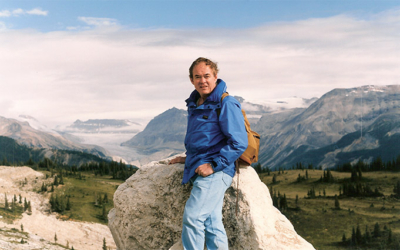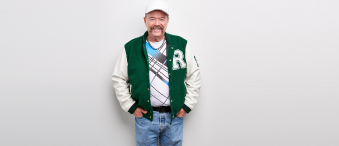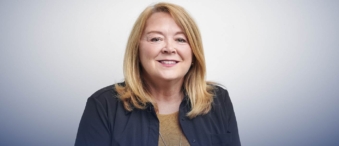Clarence Byrd was always keenly aware of how he wanted to live his life and what would happen when he was gone. He passed away peacefully on May 30, 2020, through the Medical Assistance in Dying (MAiD) program. In the days leading up to his passing at his home in downtown Ottawa, he carefully planned how he would leave a gift in his will to The Ottawa Hospital — ensuring his strong belief in philanthropy would continue for years to come.
Clarence and his wife, Ida Chen, were married for 43 years. It was a beautiful life, during which they did almost everything together. “From day one, we were best friends, and our complementary skills allowed us to produce more than 150 books on financial accounting and taxation including Canadian Tax Principles, the leading tax text for Canada’s colleges and universities,” wrote Clarence before he died.
“Our life together was beyond our wildest dreams; it was a wonderful romance.”
— Clarence Byrd
After retiring from teaching 15 years ago, Clarence and Ida were together constantly. They loved the outdoors and enjoyed every minute of their time together hiking, skiing, or biking all over North America.
Shocked by a cancer diagnosis
However, in December 2016, Ida faced a shocking diagnosis – glioblastoma, a particularly aggressive type of brain tumour. She faced multiple surgeries, one that included a revolutionary microscope, which was on loan to our hospital at the time. Shortly after that particular surgery, recognizing how vital this piece of equipment was, Clarence and Ida made a substantial contribution towards its purchase. Philanthropy was always an important part of their life and thanks to their generosity, many patients have benefitted from this lifesaving surgical tool, one of only a handful in Canada.

By November 6, 2019, Clarence said goodbye to the love of his life. Ida passed away peacefully with medical assistance. She no longer had to suffer.
Unbelievably, less than four months after Ida’s death, Clarence was diagnosed with esophageal cancer. He would learn that because of the tumour’s location, surgery was not an option, and he was given 12 to 18 months to live.
That’s when Clarence set into motion his plan for how he would live the rest of his days and what would happen to his estate when he was gone. He applied for MAiD and was approved. This news gave Clarence the peace of mind he needed, “There was tremendous comfort knowing that I would not have to undergo unnecessary suffering at the end of my life,” wrote Clarence.
Educating others well into the future
Laura Wilding, Advanced Practice Nurse at The Ottawa Hospital and Program Manager, Champlain Regional MAiD Network, helped plan both Clarence and Ida’s procedures. Since MAiD was introduced four years ago, patients have come forward to tell Laura that they want to support the hospital by leaving a gift in their will. Clarence made it very clear to her that’s what he wanted to do. “He actually delayed having MAiD to make sure his donation was allocated the way he wanted,” says Laura.
“They found that the doctors, nurses, and staff were all so accommodating and knowledgeable about their conditions. This was the reason that Clarence wanted to leave his gift to the hospital.”
— Joshua Smith
The couple had successful careers, and it was important to Clarence to use his good fortune to help pave the way for the future, even after he was gone. Laura recalls Clarence saying, “’We have money, we are philanthropists, and we feel strongly that more people need to know and understand MAiD.’”


Clarence’s accountant, Joshua Smith, a partner at Welch LLP, explains that Clarence and Ida’s experiences at The Ottawa Hospital left an impression. “They found that the doctors, nurses, and staff were all so accommodating and knowledgeable about their conditions. This was the reason that Clarence wanted to leave his gift to the hospital,” says Joshua.
“His generosity will have a long-term impact on care at the hospital and Clarence knew that.”
— Laura Wilding
Margaret Tardiff was a close friend of the couple. She emphasized how education was always so important to Clarence and his gift to our hospital will honour that well into the future. “He was always educating himself and others; he felt that education would help people to understand the value of the MAiD program,” says Margaret.
A lasting legacy
Clarence’s legacy will be felt for decades by patients and their families at our hospital. “His generosity will have a long-term impact on care at the hospital and Clarence knew that,” says Laura.
Clarence passed away at the age of 82 in his home, on his own terms, and with his estate planned exactly to his wishes. It marked the end of a well-celebrated life that included 43 years with his beloved wife, Ida. In fact, Clarence wrote in an article for the Ottawa Citizen before his death, “Our life together was beyond our wildest dreams; it was a wonderful romance.”
A wonderful life with a legacy that will live on thanks to Clarence’s forward thinking to support The Ottawa Hospital – a philanthropist to the very end.

The Ottawa Hospital is a leading academic health, research, and learning hospital proudly affiliated with the University of Ottawa.




